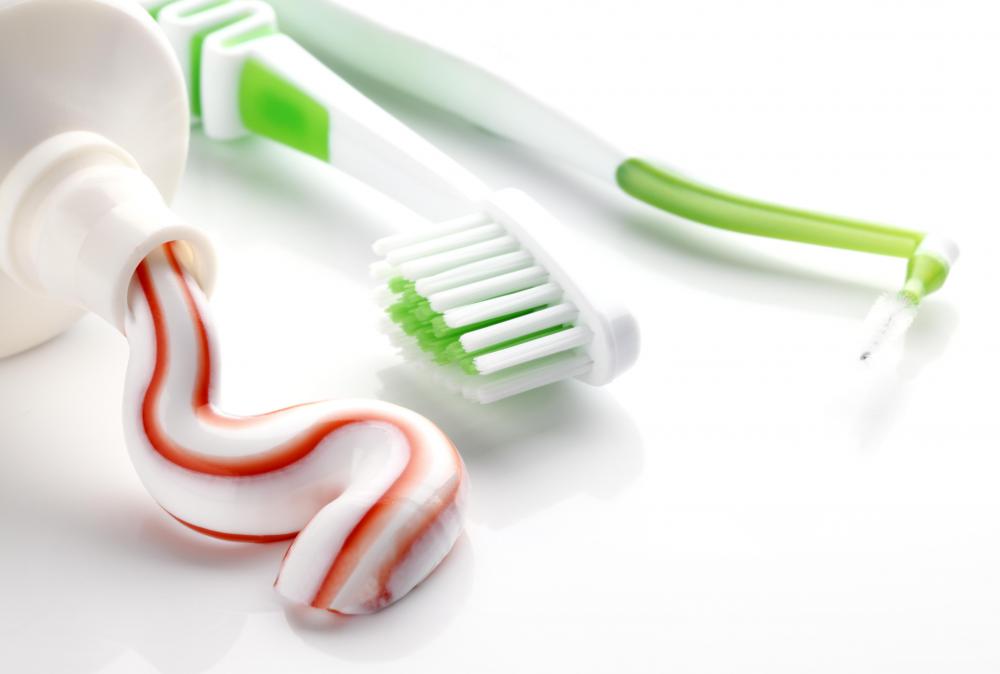At BeautyAnswered, we're committed to delivering accurate, trustworthy information. Our expert-authored content is rigorously fact-checked and sourced from credible authorities. Discover how we uphold the highest standards in providing you with reliable knowledge.
What are the Pros and Cons of Homemade Toothpaste?
The idea of making homemade toothpaste may sound strange to some, but it can be a viable way to save money and avoid some of the controversial ingredients in brand name toothpaste. There are a several possible pros and cons to keep in mind. For example, depending upon the recipe, homemade toothpaste generally costs less than store-bought toothpaste and does not contain the fluoride, detergents, or other added chemicals found in traditional toothpastes. On the con side, time must be spent researching recipes, appropriate containers must be found and purchased, and it takes a certain amount of work to mix the chosen toothpaste recipe.
Homemade toothpaste generally costs around half the price of the low end, store-bought variety. Many people who make their own homemade toothpaste do so because of the possible health issues involved in some brand name toothpaste ingredients. Fluoride in particular is coming to be viewed as having more risks than benefits and has been banned from drinking water in many countries in Europe and Asia. Other ingredients that cause concern include detergents like sodium lauryl sulfate, water softeners like Tetrasodium pyrophosphate, whiteners like sodium carbonate peroxide, and stabilizers like polyethylenes.

With the peace of mind that comes from knowing what is in homemade toothpaste goes the responsibility to spend the time to research the safety and effectiveness of the ingredients. A large range of recipes can be found, many with similar ingredients, but some of them call for herbal extracts or abrasives that could possibly cause an allergic reaction or be too damaging to the tooth enamel. One recipe that would need careful examination calls for honey and crushed charcoal. Honey obviously contains a lot of sugar which could cause more of the acidity and bacterial growth that toothpaste is designed to avoid, and charcoal may be too abrasive and difficult to pulverize into a powder. Some recipes list spices and essential oils that may or may not have a real benefit for teeth like myrrh, clove, thyme, sage, and orrisroot.

Although each batch of homemade toothpaste is very inexpensive, purchasing the ingredients the first time can add up quickly especially if the chosen recipe calls for several essential oils. While some of the common ingredients in homemade toothpaste recipes can be found in most grocery stores, others may require visiting a specialty store. For example, many recipes call for glycerin; it can be found in drugstores in small amounts or in feed stores by the gallon.

Finding good airtight containers, preferably ones that make it easy to dispense the homemade toothpaste, can be a challenge and another expense. Some common choices are to put portions of the toothpaste in plastic baggies with a small hole so that the container is disposable, use jars or plastic cups with lids, or purchase refillable tubes similar to store-bought toothpastes from a camping supply store. Making the toothpaste can be expected to take about ten minutes; measure the ingredients, stir them together, and then fill the chosen container with the mixture.
AS FEATURED ON:
AS FEATURED ON:

















Discussion Comments
Where did you find refillable tubes?
Post your comments